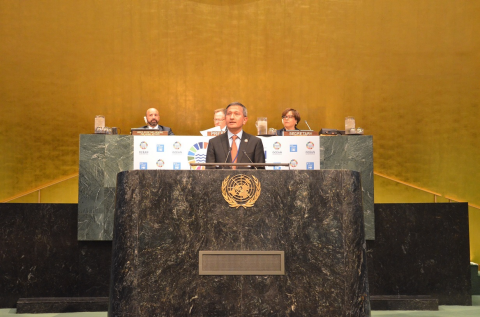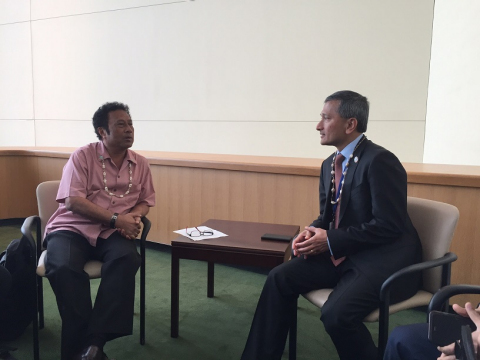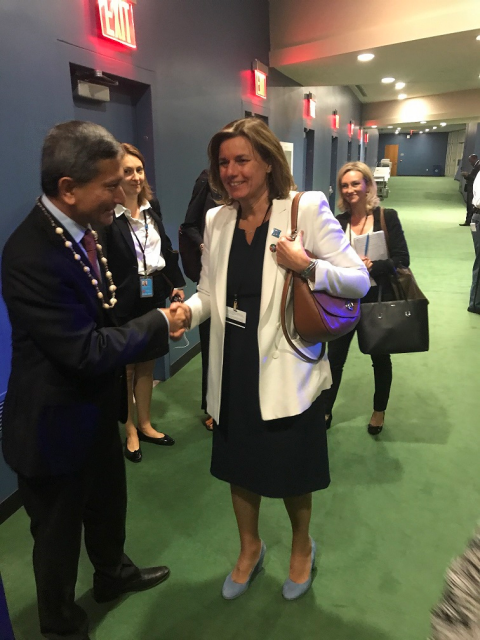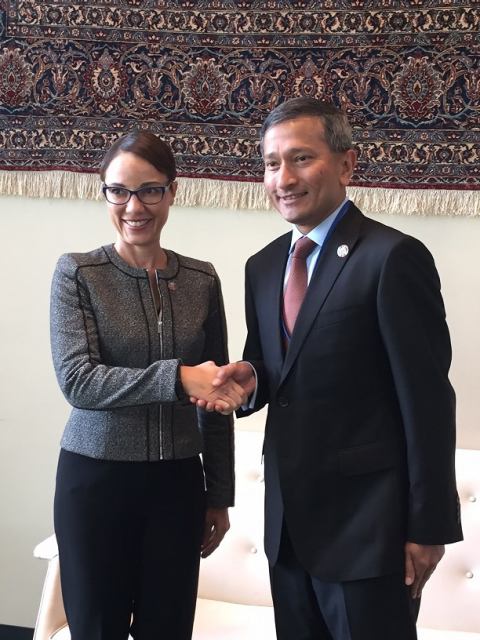
Minister for Foreign Affairs Dr Vivian Balakrishnan delivering Singapore’s national statement at the High-Level United Nations Conference to Support the Implementation of Sustainable Development Goal 14, 8 June 2017 (Photo Credit: MFA)

Minister for Foreign Affairs Dr Vivian Balakrishnan meeting with President of Palau Tommy Remengesau on the sidelines of the High-Level United Nations Conference to Support the Implementation of Sustainable Development Goal 14, 8 June 2017 (Photo Credit: MFA)

Minister for Foreign Affairs Dr Vivian Balakrishnan meeting with Deputy Prime Minister of Sweden Isabella Lövin on the sidelines of the High-Level United Nations Conference to Support the Implementation of Sustainable Development Goal 14, 8 June 2017 (Photo Credit: MFA)

Minister for Foreign Affairs meeting with Minister of Foreign Affairs and Foreign Trade of Jamaica Kamina Johnson Smith on the sidelines of the High-Level United Nations Conference to Support the Implementation of Sustainable Development Goal 14, 8 June 2017 (Photo Credit: MFA)
Minister for Foreign Affairs Dr Vivian Balakrishnan was in New York to attend the High-Level United Nations Conference to Support the Implementation of Sustainable Development Goal 14 (the Ocean Conference) from 7 to 8 June 2017.
Minister Balakrishnan delivered Singapore’s national statement at the Conference on 8 June 2017. He underlined the need to achieve sustainable development of the oceans in a balanced and integrated manner, and in accordance with the United Nations Convention on the Law of the Sea (UNCLOS). He highlighted measures taken by Singapore to promote cleaner shipping, reduce marine debris, enhance environmental conservation and support marine biodiversity as part of Singapore’s voluntary commitments.
Minister Balakrishnan also reaffirmed Singapore's commitment to the Paris Agreement on climate change and its swift implementation. The text of Singapore's national statement is enclosed.
Minister Balakrishnan also had bilateral meetings with President of Palau Tommy Remengesau, Deputy Prime Minister of Sweden Isabella Lövin and the Minister of Foreign Affairs and Foreign Trade of Jamaica Kamina Johnson Smith. They reaffirmed the warm and friendly bilateral ties, and discussed ways which small states can support the achievement of the Sustainable Development Goals.
. . . . .
MINISTRY OF FOREIGN AFFAIRS
SINGAPORE
8 JUNE 2017
---------------------------------------------------------------------------------------------
EDITED TRANSCRIPT OF SINGAPORE’S NATIONAL STATEMENT, DELIVERED BY MINISTER FOR FOREIGN AFFAIRS DR VIVIAN BALAKRISHNAN AT THE HIGH-LEVEL UN CONFERENCE TO SUPPORT THE IMPLEMENTATION OF SUSTAINABLE DEVELOPMENT GOAL 14, 8 JUNE 2017 AT 1545 HRS
Mr President,
Excellencies,
Distinguished delegates,
1. It is an honour to address this Conference on behalf of the tiny island city state of Singapore. It has been two years since the United Nations adopted the 2030 Agenda for Sustainable Development and I think it is time for us to take stock of the progress that we have made on the conservation and sustainable use of the oceans, seas and marine resources.
2. For a small city state like Singapore, the oceans and seas are inextricably linked to our survival and our wellbeing. The oceans provide livelihood for millions of our people, enable food security, enable maritime trade, regulate the climate, and are an important source of renewable energy. But we all know that our oceans face existential threats including overfishing, climate change and marine pollution.
3. These are serious issues that confront Singapore and our fellow small island developing states. We have no buffer, we have no hinterlands. Any increase in sea-levels, coastal degradation or marine pollution will impact all of us severely. For this reason, Singapore made a small voluntary contribution to the Conference Trust Fund in order to enable other small island developing states to be represented at this Conference; to ensure that our voices are heard.
Call for Action
4. I would like to congratulate all the delegations for working so hard and so well together to conclude the Call for Action. Singapore is privileged to have worked with Portugal to facilitate the negotiations on the outcome document. The Call for Action demonstrates our collective determination to conserve and to sustainably use our oceans and seas.
Sustainable Use of the Oceans
5. But the smart formulation of words alone is not enough. We need resolve, and we need to be guided by principles.
6. First, we need universal adherence to international law. Singapore reaffirms the United Nations Convention on the Law of the Sea (UNCLOS); we believe this provides the legal framework for all the activities in the oceans and seas. A rules-based international order provides the necessary framework for all States to operate on a common basis in the global environment. This is important even as we broaden our understanding of the ocean issues to include new areas such as the conservation and sustainable use of marine biological diversity in areas beyond national jurisdiction. In line with this approach, Singapore, together with Jamaica, Argentina, the Netherlands, Papua New Guinea, and the UN Office of Legal Affairs, organised an event on 6 June to discuss how UNCLOS - the “constitution of the oceans” - can play a central role in our efforts to achieve Goal 14. I am pleased to report that this event saw lively discussions that will contribute to the broader discourse on the implementation of Goal 14.
7. Second, we need to get the right balance between economic growth and environmental sustainability, and to strengthen our ocean ecosystems. On this we need to be guided by science and data, and less by politics and polemics.
8. Third, challenges involving the global commons, including climate change and ocean conservation, require collective international solutions. None of us can solve these problems unilaterally. All States and all stakeholders must cooperate. I am glad to see that we are deepening such conversations through the seven partnership dialogues at this Conference, and the voluntary commitments by stakeholders.
The Case of Singapore
9. I want to take this occasion to reaffirm Singapore’s commitment to the Paris Agreement and the Paris Pledge, under which we aim to reduce our emissions intensity by 36% from 2005 levels by 2030. Singapore is also committed to implement a carbon tax by 2019.
10. As one of the world’s busiest ports, Singapore has also undertaken measures to protect our marine environment. The Maritime and Port Authority of Singapore (MPA) was one of the first maritime administrations to launch a comprehensive pro-environment initiative, known as the Maritime Singapore Green Initiative. Singapore is also putting in place measures to become an LNG bunker ready port by 2020, which will reduce carbon emissions and contribute to cleaner and greener shipping.
11. Marine debris also remains a concern for Singapore. Apart from conducting surveys and installing monitoring equipment, we will encourage the distribution of data for use by the public and raise public awareness through an integrated national citizen science programme.
12. Our efforts have borne fruit in the form of our own rich marine biodiversity. A total of 255 species of hard corals have been recorded in our waters, and this constitutes about 40% of the corals found in Southeast Asia, a third of the global total. We also harbour 12 species of sea grass in our waters, 52% of the species found in the Indo-Pacific region.
13. The point is if a small busy port like Singapore can have such natural resources and is making efforts to conserve it, surely everyone else can and should do so as well.
14. Let me conclude by saying that Singapore has benefitted in the past from technical assistance provided by UN agencies such as the UN Development Programme, and we believe in paying this forward. We have established the Singapore Cooperation Programme (SCP) in 1992 to provide training and capacity building courses for our partners. In 2015, we went a step further and launched the Sustainable Development Programme (SDP) under the SCP to support the 2030 Agenda, and this focuses specifically on courses on climate change adaptation strategies and water quality management. We will launch a course on Sustainable Oceans and Marine Resources next month to cover issues such as climate change and marine biodiversity conservation.
15. Last but not least, Singapore will be undertaking a voluntary national review of our implementation of the Sustainable Development Goals at the High Level Political Forum of the Economic and Social Council in 2018, including specifically the implementation of Goal 14. This has an important role to ensure progress in the implementation.
16. In closing, the issue of oceans is a pertinent and pressing one. This Conference represents a critical first step in what will be a long journey towards the conservation and sustainable use of our oceans, seas and marine resources for sustainable development. Singapore calls upon all Member States, UN agencies, research bodies, the private sector, the donor community and other stakeholders to come together to protect our oceans and seas for the benefit of our people and our future generations.
17. Thank you.
. . . . .